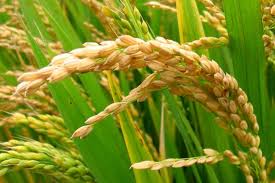Federal Government and the International Fund for Agricultural Development through its assisted Value Chain Development Programme (FGN/IFAD-VCDP), have trained 100 Enugu farmers and extension agents on best rice production practice.
The Enugu VCDP office engaged a Consultant to provide training services on Good Agronomic Practices (GAP) to the farmers as a way of increasing high productivity in rice.
The farmers were drawn from the rice producing areas of intervention which include Aninri, Isi Uzo and Nkanu East Local Government Areas of Enugu State.
Conducting trainings on GAP round the LGAs, an Agric expert, Mr Godfrey Ajayi, urged the farmers to adopt the good agronomic practices for the improved and best quality rice.
He said that IFAD was much interested on how judiciously they used the inputs given to them to achieve maximum yields, stressing that they should embrace dry season rice farming as that would reduce flood effects drastically.
“Rice farmers should consider their environment and what it tells them and these days, climate change has affected the seasonal cropping and there is need for farmers to understand their environment before they go into farm,” he advised them.
The VCDP agronomist took the farmers round the farming cycle on how best to achieve maximum yields.
According to him, a farmer should ascertain the size of his farmland and the exact quantity of inputs that should go into it.
Ajayi said, “A hectare of land is 100m by 100m and what a rice farmer should use proportionately is 50kg of rice seeds, 4 bags of NPK, 2 bags of Urea, one litre of selective and non-selective herbicides each.”
Farmers, he said, should live healthy in order to be active in the farm, saying “When you fall sick and refuse to take proper care of yourself, it will equally affect your farming activities.
“Your protective wears to the farmland should always be on your mind. Think about your safety when engaged in farming activities,” he said.
He further told them that the part of the good agronomic practices was the selection of land, preparing it, bonding it, especially dry season farming, making of nursery and transplanting within 21 days from nursery.
The VCDP, Agric Production Officer of the State, Mr Emma Agbo demonstrated to farmers on land measurement, land preparation, basal application, control of pests, row planting and spacing of rice in 20cm by 20cm.
According to him, while preparing the land, farmers should apply fertilizers as a base.
He also trained farmers on water management and timing of labour.
Addressing the farmers, the State Programme Coordinator, Dr Edward Isiwu, said the training was aimed at teaching rice farmers in the state on best way of growing rice.
He noted that in effort towards restoring losses farmers in Enugu incurred due to flood invasion during the last rainfall, FGN/IFAD provided agro-inputs such as fertilizers, agrochemicals, certified seed rice and water pumps to all the flood victims to recover their losses.
He said the seed rice was what they were being trained on how best to grow to ensure bumper harvest.
The coordinator charged the farmers to be at their best delivery this year owing to the training.
Isiwu further encouraged the farmers to make use of the inputs judiciously so as to reclaim their losses to flood.
He, however, commended the donor agency in their emergency response towards the flood victims and described the approach as long lasting succor to the farmers.
The Coordinator equally thanked Gov. Ifeanyi Ugwuanyi on the massive support he had been given to the Programme since its inception.
Some of the lead farmers trained expressed their heartfelt joy over the training.
One of them, Mrs. Oluchi Aladi of Ofuobi MPCS, Okpanku in Aninri LGA shared her experience on dry season rice farming.
“Through VDCP, I have been taught on advantages of dry season rice farming which I never knew as a rice farmer and I engaged on it and saw it myself that it yields more.”
She therefore appreciated FGN/IFAD/ VCDP for the training and assured that she would extend the training to other farmers within the locality.




